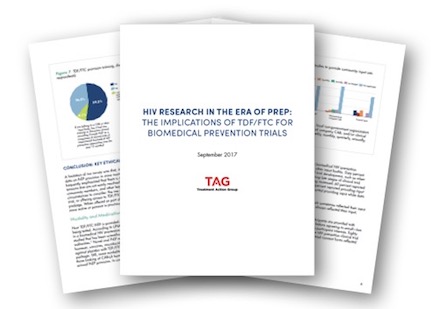September 27, 2017 – The effectiveness of pre-exposure prophylaxis (PrEP) with the antiretroviral drug combination TDF/FTC (Truvada) raises questions regarding the design and conduct of trials of other candidate biomedical HIV prevention interventions, such as vaccines, passive immunization and alternative forms of PrEP. This white paper, made possible with support from Aidsfonds, summarizes the recommendations that have been published in the scientific literature to date, and highlights results from a survey on the topic targeted to community-based advocates, including individuals who sit on clinical trial advisory bodies.
In the past, efficacy trials of biomedical HIV prevention candidates have typically compared an experimental intervention to a placebo in individuals at high risk of acquiring the infection, with all participants receiving a background package of prevention services including risk reduction counseling and condoms. The effectiveness and increasing availability of Truvada PrEP now raises questions as to how it should be incorporated into study designs.
A few overarching recommendations emerged from both the literature review and the survey for all biomedical prevention trials. First, all trial participants should receive comprehensive education on PrEP and referrals to PrEP services if they are interested. In terms of more active provision of TDF/FTC to participants, feedback and guidelines are more nuanced; however, in all trial scenarios presented in the survey there was a strong preference for PrEP to be provided if at all possible. Forty-eight percent of respondents believed that sponsors should provide free, onsite TDF/FTC PrEP services, whereas 27.9% of respondents only wanted referrals for medication and services and 23.9% of respondents wanted free medication provided and referrals to outside medical services.
The clear preference for active provision of PrEP supports a second recommendation made by Jeremy Sugarman, MD, MPH of the Johns Hopkins Berman Institute of Bioethics: given the high efficacy and large evidence-base for TDF/FTC PrEP, researchers should always be required to make the case for why they will not provide PrEP or allow its use in a trial, placing the burden of proof on restricting access rather than the reverse.

